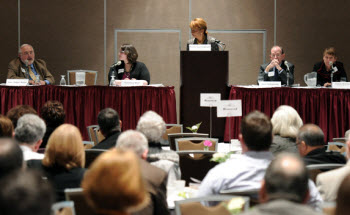Snyder adviser, educator pull no punches before large audience at education summit
Oakland Schools Superintendent Vickie Markavitch and gubernatorial adviser Bill Rustem sat next to one another at a panel to discuss education issues Tuesday, but their views on education reform are still far apart – a distance that could play out in upcoming debates at the State Capitol over school legislation.
A testy exchange over the Educational Achievement Authority district in Detroit at “The Future of Education” summit sponsored by the Center for Michigan illustrated the different viewpoints held by Michigan’s education establishment and the policy-makers who would revamp its operations.
The summit, attended by nearly 500, was held to analyze the findings of the Center’s new report, “The Public’s Agenda for Public Education,” which presented the results of a year-long community engagement effort.
Rustem had just finished detailing the state’s efforts to help 15 “consistently low-achieving” schools in the Detroit Public Schools via the EAA, an interlocal agreement between Eastern Michigan University and the DPS. Those 15 had been “on the lowest-performing list for a decade,” and the strategy to help them improve was clear and open, based on a model adopted in New Orleans after Hurricane Katrina disrupted the city.
“Those who argue this is a conspiracy to take over public schools aren’t telling the truth,” Rustem said. “Tell me an alternative, and we’ll deal with it. We can continue to write those kids off, or we can do something about it.”
Markavitch agreed Michigan residents “have to do something about the worst schools. But I don’t know if the EAA is the model that will work.”
From there, the two points of view, between educators and reformers, continued to assert themselves, and diverge.
Markavitch and John Austin, president of the state Board of Education, spoke in favor of better funding, more support and a careful approach to increasing school choice. Rustem, along with Lansing attorney Peter Ruddell and Jamey Fitzpatrick, president of Michigan Virtual University, advocated for reforms debated in the Legislature last year and which are expected to come up again soon.
The EAA bill died in last year’s lame-duck legislative session. Rustem complained that even with clear-cut goals and a top limit of 50 schools in the EAA district, it still faced opposition from educational interests. Markavitch countered that the original bill was far more wide-reaching when it was introduced, and the pushback was to be expected.
What's nextThe Center for Michigan is hosting another summit, this one in Kalamazoo on Feb. 7. For more details and to reserve a space at the free event, click here. |
“The EAA should not be controversial,” said Austin. “My hopes are that it will work.”
After that early skirmish, the two sides moved on to the idea of increasing school choice, with Fitzpatrick and Ruddell advocating new funding models and more places for students to spend their per-pupil dollars, while Markavitch and Austin pleaded for a go-slow approach.
“Public education is changing and will continue to change at a very rapid pace,” said Fitzpatrick. “Would we be proactive or reactive?”
Ruddell made the same argument in favor of unbundling school funding to meet Gov. Rick Snyder’s policy guidance that education be “any time, any place, any way, any pace.”
“How do we change the financing structure to make sure each student gets the best education on their individual path?” Ruddell asked. “Education isn’t a place or a destination, it’s a service. That’s part of the paradigm shift we’re trying to employ.”
Boost to early childhood discussed
Other panels dealt with the need for more early-childhood education and support for teachers, two areas receiving strong support from participants in more than 250 community meetings held by the Center, along with large-sample polls, which together involved more than 7,500 diverse Michigan residents.
 Sen. Roger Kahn, R-Saginaw Township, said he was advocating for at least $130 million in increased funding for the state’s Great Start Readiness Program, preschool classes for children from low- and moderate-income families. Gov. Rick Snyder and House Speaker Jase Bolger also have pledged support for an increase.
Sen. Roger Kahn, R-Saginaw Township, said he was advocating for at least $130 million in increased funding for the state’s Great Start Readiness Program, preschool classes for children from low- and moderate-income families. Gov. Rick Snyder and House Speaker Jase Bolger also have pledged support for an increase.
Susan Broman, director of the state’s Office of Great Start, said the money would go to free up more preschool slots in individual school districts, as well as other improvements to the program. She said longitudinal studies show that children who go to preschool are more likely to graduate on time and enjoy more academic success in general.
“If I were building a house, would I skimp on the foundation?” she said.
Paul Hillegonds, senior vice president at DTE Energy, echoed the case for early investment in education.
“The reality is, one of the most important investments we can make in the state, in terms of economic development, is early childhood education,” he said. “If we’re going to attract and retain talent, we must make this investment.”
The third panel was on teacher preparation, support and accountability. Deborah Ball, dean of the School of Education at the University of Michigan and chair of the Michigan Council for Educator Effectiveness, said the United States lags behind other countries in how it trains and supports its 3.5 million teachers.
In the U.S., we’ve developed a myth that “the way to learn to teach is figuring it out on your own,” she said. “Imagine if surgeons or airplane pilots learned on their own. And these are our children.”
Staff Writer Nancy Nall Derringer has been a writer, editor and teacher in Metro Detroit for seven years, and was a co-founder and editor of GrossePointeToday.com, an early experiment in hyperlocal journalism. Before that, she worked for 20 years in Fort Wayne, Indiana, where she won numerous state and national awards for her work as a columnist for The News-Sentinel.
Michigan Education Watch
Michigan Education Watch is made possible by generous financial support from:
Subscribe to Michigan Health Watch
See what new members are saying about why they donated to Bridge Michigan:
- “In order for this information to be accurate and unbiased it must be underwritten by its readers, not by special interests.” - Larry S.
- “Not many other media sources report on the topics Bridge does.” - Susan B.
- “Your journalism is outstanding and rare these days.” - Mark S.
If you want to ensure the future of nonpartisan, nonprofit Michigan journalism, please become a member today. You, too, will be asked why you donated and maybe we'll feature your quote next time!


 MAKING HIS CASE: Sen. Roger Kahn (far left) discusses the need to vastly increase funding for early childhood programs during a panel at the Center for Michigan’s “Future of Education” summit in Lansing Tuesday. “If the governor’s budget falls short, I’ll push for $140 million,” Kahn said. (Bridge photo/Lon Horwedel)
MAKING HIS CASE: Sen. Roger Kahn (far left) discusses the need to vastly increase funding for early childhood programs during a panel at the Center for Michigan’s “Future of Education” summit in Lansing Tuesday. “If the governor’s budget falls short, I’ll push for $140 million,” Kahn said. (Bridge photo/Lon Horwedel)